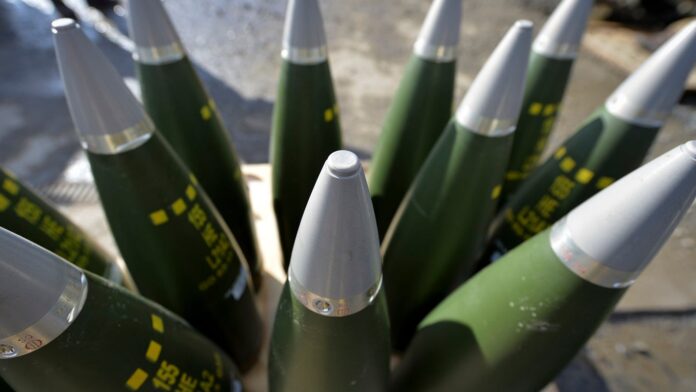The UK Ministry of Defence (MoD) is planning a multi-year procurement framework to secure high explosive material to support Ukrainian demand for warheads, artillery, and other weapons, amid a global bottleneck in munitions production.
Releasing a single statement of user need (SSUN) on 28 November, the MoD revealed its intention to develop a high explosive supply chain specifically to assist with Ukrainian requirements, indicating the potential development of a country-specific industrial capability inside the UK or overseas, funded by the UK.
Working under the moniker of Task Force Kindred, the SSUN revealed that an industry day would take place on 11 December to determine capabilities and resources available in the private sector, specific to the provision of “high explosives for warheads and artillery projectiles, peopellants for boost/rocket motors and artillery”, as well as “pyrotechnics”.
In its reasoning, the MoD stated that it required to “secure supply of a significant quantity of energetic materials” for the next three years, citing a “critical bottleneck in munitions production” and availability of energetic materials, including ammonium and nitric acid.
The MoD intends to “reverse this” through a “coherent set of multi-year investments in UK-based or overseas suppliers”, funded through part of the “annual £3bn Ukraine budget”, and could include investment in facilities and infrastructure.
The move comes on the back of the announced creation of a new UK-based factory to produce M777 155mm lightweight towed howitzers, with Ukraine one of the most likely destination, given the British Army does not use the platform.
Has the UK been too slow off the mark?
The clamour for the raw materials of munitions manufacture, as defence industries in the UK, Europe, and the US spool up manufacturing to meet the demand, not just from Ukraine, but also all its suppliers.
To date, millions of artillery rounds have been provided by the US and Europe to Ukraine, particularly in the 155mm range, as Kyiv continues to persist in a war that passed the 1,000-day landmark recently.
However, with all countries effectively competing for the same raw materials and for the business from such suppliers, it is far from certain that the UK MoD will be able to acquire the resources it needs.
In August 2024, UK-based Astor Defence secured a four-year deal to supply Finnish defence OEM Nammo with TNT for the production of 155mm artillery shells.
In its release, Astor Defence stated that it would provide Nammo Group with “thousands of tons” of TNT, coming weeks after the Norwegian government announced in July 2024 that it had entered into a multi-year agreement with Nammo on artillery, missile, and rocket munitions.
The company also said it has “spare capacity” for TNT supply through 2025.
In November 2024, the US revealed that it would reestablish TNT production with a $217.5m contract for the design, build, and commission of a Trinitrotoluene facility to Repkon USA-Defense.
Better known as the acronym TNT, Trinitrotoluene is used in the manufacture of military munitions, and is the prime high explosive used in the production of artillery shells, as well as aerial bombs and infantry grenades. The new facility will be built in Kentucky and expected to be completed by November 2028.
The award will reestablish TNT production “swiftly and at scale” on US soil for the first time in decades, the US Army stated in an 8 November release.
“Reshoring TNT production gives us the ability to control and secure our supply chain for this vital component, especially in an era of increasing global challenges,” said Douglas Bush, Assistant Secretary of the Army for Acquisition, Logistics and Technology.
Supply chains stretched by global demands
In March, a report by analytics firm GlobalData examined the strain placed on global supply chains as an intensifying rearmament race, driven by geopolitical tensions and escalating defence budget, was setting new demands for an industrial base struggling to keep up with demand.
Speaking in March 2024, James Marques, defence and security analyst at GlobalData, said “vital items” such as artillery shells, air defence missiles, and armoured vehicles were seeing “rates of attrition in the war in Ukraine at rates unheard of in recent times”.
The repercussions of this heightened demand are reverberating across supply chains, with Western nations striving to replenish depleted stocks while simultaneously supporting Ukrainian forces.
The UK, for instance, has confirmed that it had donated 400,000 artillery shells to Ukraine and had earlier inked deals with companies such as BAE Systems to increase munitions production. Similarly, companies like Rheinmetall and KNDS in Europe are forging ahead with new production lines to meet the escalating demand.



